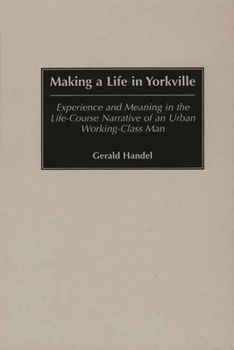Making a Life in Yorkville: Experience and Meaning in the Life-Course Narrative of an Urban Working-Class Man
Select Format
Select Condition 
Book Overview
Making a Life in Yorkville, based on the verbatim, unedited life-course narrative of an urban, working-class, middle-aged man, expands our understanding of the human life course beyond the currently dominant approaches. It presents a comprehensive and rounded life-course narrative of an ordinary man through a systematic analysis. By utilizing some established concepts and by formulating some new concepts, particularly relating childhood to adulthood and concepts related to how time is interpreted, Handel offers an advance both in methodology and in the theoretical approach to the study of the life course. Theoretically, the work falls broadly within the symbolic interactionist framework of sociological and social psychological thought. Methodologically, it argues for the careful study of the lives of ordinary people, people who are not celebrities or exotics, thus people who have no claim on public attention. This important new work will be a welcome addition to the literature on life course studies.
The first part of the book explores the idea of the life course in its various contexts: the community, the historical, the narrative, and the theoretical. The second part introduces and reproduces verbatim the life history of Tony Santangelo, an ordinary, working-class man. The third part discusses and analyzes the life history presented. Because most life histories are edited, this book, unique in its exact reproduction of the subject's narrative, makes it possible for the reader to use the information in the life history in ways different from Handel's use.




